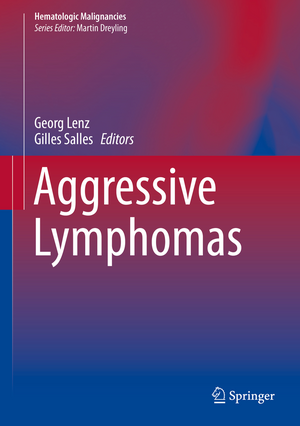Aggressive Lymphomas: Hematologic Malignancies
Editat de Georg Lenz, Gilles Sallesen Limba Engleză Hardback – 15 ian 2019
Din seria Hematologic Malignancies
- 5%
 Preț: 601.31 lei
Preț: 601.31 lei - 5%
 Preț: 717.73 lei
Preț: 717.73 lei - 5%
 Preț: 1039.95 lei
Preț: 1039.95 lei - 5%
 Preț: 738.20 lei
Preț: 738.20 lei - 5%
 Preț: 987.86 lei
Preț: 987.86 lei - 5%
 Preț: 1282.02 lei
Preț: 1282.02 lei - 5%
 Preț: 1400.03 lei
Preț: 1400.03 lei - 5%
 Preț: 990.74 lei
Preț: 990.74 lei - 5%
 Preț: 713.24 lei
Preț: 713.24 lei - 5%
 Preț: 779.73 lei
Preț: 779.73 lei - 5%
 Preț: 661.37 lei
Preț: 661.37 lei - 5%
 Preț: 540.93 lei
Preț: 540.93 lei - 5%
 Preț: 806.56 lei
Preț: 806.56 lei - 5%
 Preț: 720.02 lei
Preț: 720.02 lei - 5%
 Preț: 850.68 lei
Preț: 850.68 lei
Preț: 862.76 lei
Preț vechi: 908.18 lei
-5% Nou
Puncte Express: 1294
Preț estimativ în valută:
165.10€ • 170.58$ • 137.34£
165.10€ • 170.58$ • 137.34£
Carte tipărită la comandă
Livrare economică 15-21 martie
Preluare comenzi: 021 569.72.76
Specificații
ISBN-13: 9783030003616
ISBN-10: 3030003612
Pagini: 371
Ilustrații: VII, 360 p. 70 illus., 65 illus. in color.
Dimensiuni: 178 x 254 mm
Greutate: 0.82 kg
Ediția:1st ed. 2019
Editura: Springer International Publishing
Colecția Springer
Seria Hematologic Malignancies
Locul publicării:Cham, Switzerland
ISBN-10: 3030003612
Pagini: 371
Ilustrații: VII, 360 p. 70 illus., 65 illus. in color.
Dimensiuni: 178 x 254 mm
Greutate: 0.82 kg
Ediția:1st ed. 2019
Editura: Springer International Publishing
Colecția Springer
Seria Hematologic Malignancies
Locul publicării:Cham, Switzerland
Cuprins
PART I: Epidemiology, Pathology and molecular Pathogenesis: Epidemiology.- Pathology and molecular pathogenesis of DLBCL and related entities.- Pathology and molecular pathogenesis of Burkitt lymphoma and lymphoblastic lymphoma.- Pathology and molecular pathogenesis of T-cell lymphoma.- Part III: Future directions in aggressive lymphomas: Role of modern imaging in aggressive lymphoma.- Kinase inhibitors.- Immunologic approaches.- Other novel targeted therapies.- How biology will help guiding our treatment decisions?.
Notă biografică
Professor Georg Lenz is Director of the Department of Medicine A, Hematology, Oncology and Pneumology at the University Hospital in Münster, Germany. Before his move to Münster he previously worked at the Ludwig-Maximilians University Munich, the National Cancer Institute in Bethesda (USA), and the Charité - Universitätsmedizin Berlin. His basic and clinical research focuses on the molecular characterization of malignant lymphomas and the performance of clinical trials using specific therapeutics.
Professor Gilles Salles is Head of the Hematology Department in Lyon University Hospitals (Hospices Civils de Lyon & Université Claude Bernard Lyon-1) and co-director of the research team “Clinical and Experimental Models of Lymphoma” at the Cancer Research Center of Lyon (Institut National de la Santé et de la Recherche Médicale). He trained in Hematology and Immunology at the Université Claude Bernard in Lyon and at the Dana Farber Cancer Institue (Havard Medical Scholl, Boston, USA). He conducted several leading international clinical trials as well as translational studies in the field of lymphoma.
Professor Gilles Salles is Head of the Hematology Department in Lyon University Hospitals (Hospices Civils de Lyon & Université Claude Bernard Lyon-1) and co-director of the research team “Clinical and Experimental Models of Lymphoma” at the Cancer Research Center of Lyon (Institut National de la Santé et de la Recherche Médicale). He trained in Hematology and Immunology at the Université Claude Bernard in Lyon and at the Dana Farber Cancer Institue (Havard Medical Scholl, Boston, USA). He conducted several leading international clinical trials as well as translational studies in the field of lymphoma.
Textul de pe ultima copertă
This book summarizes current knowledge of the biology and molecular pathogenesis of aggressive lymphomas and reviews the state of the art in diagnostic and therapeutic strategies. The aim is both to provide the reader with a sound understanding of the very significant progress that has been achieved in the understanding and management of these malignancies over recent years and to facilitate appropriate choice of the therapeutic strategy in individual cases. The assessment of different prognostic parameters are clearly presented in order to permits effective risk stratification that impacts on treatment choice. Recent insights into lymphomagenesis are exemplified and may assist in identifying emerging therapeutic targets. The comprehensive and up-to-date nature of the book will make it an ideal reference for all physicians and researchers interested in lymphoma, including clinicians from various medical specialties, biologists, pathologists, radiologists and nuclear medicinespecialist, as well as students.
Caracteristici
Summarizes current knowledge of the biology and molecular pathogenesis Reviews the state of the art in diagnostic and therapeutic strategies Facilitates treatment choice in individual cases
